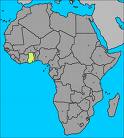Three weekends ago my group traveled down to
The importance of the Cape Coast Region lies in its position as the main link between the maritime trade routes of the European powers and the terrestrial trade routes through the Western Horn of Africa. Through the 1700’s, Cape Coast economy was most consumed by its role as the heart of the slave trade – up until its abolishment in 1807 by the British parliament. Most of the slaves were captured in modern-day
Our first stop was in a small town called Assin Manso, an hour from
Our next stop was at Elmina.
The most intense part for me was the “door of no return,” which apparently all such slave castles had. This door opens from the final dungeon out of the castle wall to the ocean, where small boats would ferry the captives to the giant ships waiting further out in the water. This door thus represents the end of
After Elmina we went and did a tour of the
One of the most interesting parts of these tours was observing how the context of race in the past and present was handled by the tour guides. The castles actually offer race-segregated tours (that we never actually did), which I think is an important option. One of our tour guides took the opportunity to stop our tour group and announce that he realized that those of us who are white did not directly contribute to the slave trade (awkward), while our other tour guide made a more subtle acknowledgment of the race and power equation by explaining how even before the Europeans came, Africans would enslave other Africans as trophies of war (I however find this to be an entirely off-based comparison). In any case, it was clear that all of us Americans were trying to grasp slavery and our identity within it from a different angle than that we are familiar with: looking outside of
As I watched my African-American friends grapple with the truth that most of them will never actually know which country their ancestors originated from, I couldn't help but think about the basic human need for belonging and identity. Is it enough to know where you were born, and where your parents were born and possibly your grandparents? America is unique in that with the exception of Native Americans, a great number of us do not know exactly where we come from when we try to go back to the continents on which our ancestors left - by force or through the hope of a better life. When I lived in South Korea, most everyone had detailed family trees that went back hundreds and hundreds of years. Traditions are formed upon the basic knowledge of where one came from in the course of history. In comparison, I find myself a bit lost from time to time in America, as I have not attached myself to a certain religion with which to belong, nor do I feel I have a particularly strong link to my ancestors who came to America as far back as the 1600's. But I have been raised to search for such identity within myself, which I believe is one of the reasons why travel has become such an important part of my life. It is through the experiencing of other cultures, religions, traditions and history that I can gain understanding of my identity as a person - as someone trying to understand themselves through the world around them.











